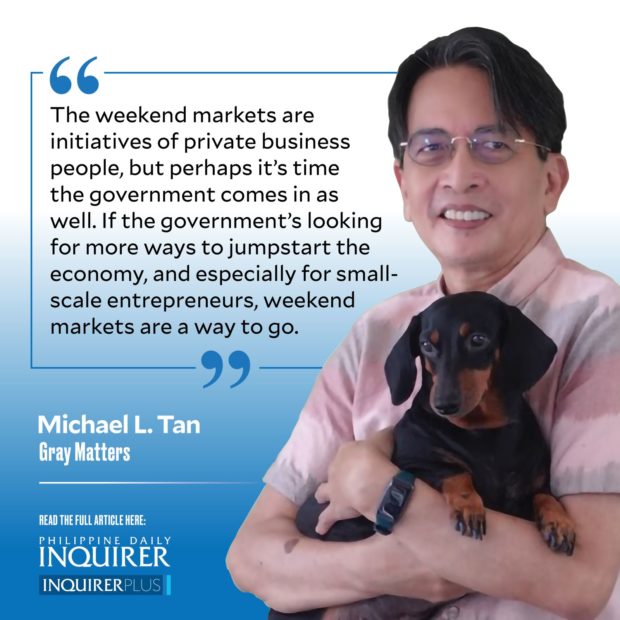Weekend markets
 Weekend markets are a good barometer, too. Before the pandemic, weekend markets were sprouting all over the country, offering a viable alternative business model for small merchants, especially those dealing with farm produce and food products. Many of the merchants could live off Saturday and/or Sunday sales in these weekend markets, paying a reasonable rental fee for space in a semipermanent (usually tented) space.
Weekend markets are a good barometer, too. Before the pandemic, weekend markets were sprouting all over the country, offering a viable alternative business model for small merchants, especially those dealing with farm produce and food products. Many of the merchants could live off Saturday and/or Sunday sales in these weekend markets, paying a reasonable rental fee for space in a semipermanent (usually tented) space.
These markets are a blend of the Euro-American farmers’ markets, where farmers bring in their produce for direct sales to consumers, and the older Asian bazaars, the night markets (pasar malam in Malaysia, Indonesia, and Singapore).
Among the local weekend markets that I began to return to after the pandemic were the ones in Salcedo Park on Saturdays and Legazpi Active Park (actually now closer to Washington SyCip Park) on Sundays.
Salcedo and Legazpi tend to be more upmarket, offering a more cosmopolitan blend of food, mostly cooked or processed, from all over the world: Thai, Indonesian, Moroccan, Spanish, and more. There are also artisanal goods—fans of Japanese waraji (straw sandals) maker Mike and his wife, who sell Japanese goods, will be pleased to know they’re back now at the Legazpi market.
It was only last Sunday that I returned to “Sidcor,” one of the oldest of the weekend markets in Metro Manila, if not the Philippines, and was often referred to by one of the many sites that they used, from the first one on Edsa and Main Street (now an SM Hypermarket) to the Lung Center, and for the last few years, Centris (Eton Center) on Edsa and Quezon Avenue.
The Centris visit was unplanned. It was the Chinese New Year, so I wanted to avoid the malls. Then one of my kids reminded me we hadn’t been back to Centris since the pandemic, so off we went to Quezon City.
The Centris vendors are more middle class, and the products are local. The visit turned out to be almost emotional reunions, meeting up old suki, and catching up on old times. Particularly memorable was Aling Narsing of Batangas, who I wrote about more than a decade ago. Over the years I watched her children growing up, and last weekend, she showed me a photo of two daughters now working in Singapore. One had finished nursing.
Narsing is still Narsing, plying me with freebies: dried kamias, a bouquet of flowers I’d never seen before, and onions, not the P400 per kilo ones but sibuyas Tagalog, certainly as good, if not better.
There were other vendors who I could not find and I figured, perhaps their children had finished college, too, and they no longer needed to do the Sunday market. Who knows how many families put their children through school, all the way up to college, through these weekend markets?
The weekend markets are initiatives of private business people, but perhaps it’s time the government comes in as well. Farmers’ markets in the US have a huge following, offering small alternative farmers an outlet for their produce. Several states issue coupons to families in need, women, children, and the elderly, so they can buy from these farms and improve their nutrition, instead of depending on junk food from supermarkets and groceries.
Long before “farm to table” became a fad, weekend markets, including the ones in the Philippines, were using this concept. My kids grew up with these markets, seeing fresh vegetables for themselves. I have to admit it was in a Sidcor market where I first learned about pumpkin flowers, and how these could be used for omelets. Look up recipes for frittata, the more sosyal name using flowers, Parmesan cheese, and spices.
The weekend markets are a far cry from the bustling ones we had pre-pandemic, which tell us about the sad state of small and medium businesses. At the weekend markets, I felt good hearing stories of the kids who made it through college, but I knew, too, there were many others who had to stop school, and whose parents have not been able to return to sell. If the government’s looking for more ways to jumpstart the economy, and especially for small-scale entrepreneurs, weekend markets are a way to go.
mtan@inquirer.com.ph




















